Darkness in August
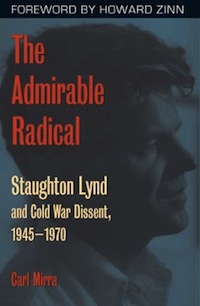
More than a few people have expressed to me some inchoate feeling that, yes, August is upon us. This seems to be an expression of discomfort with the rapidity with which the current season is falling away. And in my view, a minor symptom of a larger distemper which is, perhaps, a basic constituent of our existence. I.e., difficulty with managing time’s passage.
Some 40-something years ago, as an arrogant and passionate foe of American imperialism and a fierce demonstrator for racial equality, I was part of a demonstration that sat in Roosevelt University President Rolf Weil’s office to protest the university’s failure to grant tenure to historian Staughton Lynd (son of sociologists Helen and Robert Lynd of Middletown fame)—this was on the heels of the university demurring to acquire the Roosevelt papers that historian (and John Updike’s roommate at Harvard) Christopher Lasch (The Culture of Narcissism) wanted to bring to the university bearing that president’s name. Lasch then went across town (so to speak) to Northwestern University, and the rest, of course, is history…
I, of course, digress. The occasion for this voyage in the way-back machine is the publication of Adelphi University mentor Carl Mirra’s The Admirable Radical: Staughton Lynd and Cold War Dissent 1945-1970 (Kent University Press). From Howard Zinn’s foreword:
This is but a brief account of Staughton Lynd’s journey through academia and the world, joining his intelligence to contribute to the world wide struggle for peace and justice. He is a radical historian, a radical lawyer, a radical citizen. I have admired him enormously ever since I first met him…before he became my colleague at Spelman College. He and Alice [Lynd’s wife] are exemplars of strength and gentleness in the quest for a better world. I am proud to call him my friend and happy that he is now the subject of Carl Mirra’s biography. As one who entered the academic world after military service, I feel a special affinity for someone like Carl Mirra who has come to the academy after being trained as a marine. I admire his moral courage for his refusal to fight in the First Gulf War. It seems to me that he experience gives a special dimension to his intellectual curiosity and his passionate interest in documenting Staughton’s life.
So much for the passage of time.
* * *
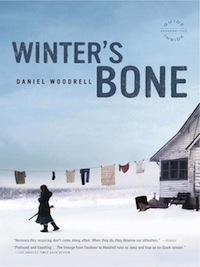
A plenitude of savvy and tasteful folks have extolled the film Winter’s Bone, which deserves superlative accolades, based on Daniel Woodrell’s novel of the same name. Along with the wonder of Jennifer Lawrence’s astonishing performance, it occurred to me that the 19-year-old actress has more of such in her tank. And by the way, the chameleonic John Hawkes delivers a character of barely modulated and unpredictable havoc.
Wherever you live, I am certain that your world is about as far away from the world depicted in Winter’s Bone that it might as well be Uzbekistan. That the filmmakers could make this story accessible and (seemingly) authentic is a rare narrative triumph.
I would expect that novelist Woodrell, who is credited with creating hillbilly noir (a distinction I would expect he could not give a care about), will deliver his next opus soon—but since you haven’t read much or any of his oeuvre you have a lot to look forward to.
* * *
Yes, I am aware it is not National Poetry Month. Nonetheless, let’s live it up. Here from Jim Harrison’s In Search of Small Gods (Copper Canyon Press):
* * *
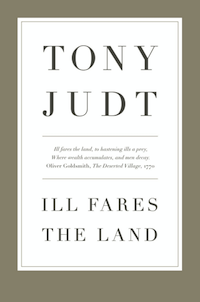
You can quickly grasp historian Tony Judt’s intention in his latest tome, Ill Fares the Land (Penguin Press):
Something is profoundly wrong with the way we live today. We have wasted the two decades since the fall of the Berlin Wall; they have been consumed by the locusts, or more precisely by the shamelessly greedy. It has been the era of all the Dicks, from Cheney to Fuld, politically “an age of the pygmies”. Unregulated markets have crashed. Wars of choice have left bloody destruction in their wake. The snouts have been buried deep in the trough. Beyond the noise of guzzling, we can hear no moral critique of what has happened, no shout of rage that things don’t have to be like this.
As an unrepentant leftie, Judt does offer hope (albeit polemical) for the future, suggesting there are better ways to handle and organize our affairs. (Judt has previously eloquently expressed his affliction with ALS.) In an exchange in the Nation, Judt explains:
Ill Fares the Land
* * *
Shamefully, I neglected to acknowledge the anniversary of the Cuban Revolution last week. (July also marks the anniversary of the Sandinista movement in benighted Nicaragua as well as two other well known uprisings). Other than releasing and exiling some troublesome (to the regime) dissidents, not much has changed in Cuba since Ann Louise Bardach’s Without Fidel (Scribner), which is currently the authoritative and definitive account of the Castro Regime endgame.
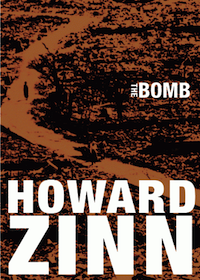
As I believe that we ignore history at our peril, I am reminding you that this week marks yet another anniversary of the United States’s atomic bombings of Japan at Hiroshima and Nagasaki. City Lights has posthumously published a slim volume, The Bomb by Howard Zinn, in which the World War II bombardier turned historian argues against the use of nuclear weapons:
It is a prescription for the endless cycle of violence and counter-violence, terrorism and counter-terrorism, that has plagued our times for which the only response is: “No more wars or bombings, of retaliation. Someone, no, we, must stop that cycle now.” The strategic argument which I and other historians have tried to answer with the violence that there was no military necessity to use the bomb is not enough. We need to confront the moral issue directly: faced with the horror visited on the hundreds of thousands of human beings by the massive bombings of modern warfare, can any military strategic political necessity justify that? And if the answer is no, as I believe, what can we learn to free us from the thinking that leads us to stand by…while the atrocities are committed in our name?
Hence this little book.
* * *
The Booker Prize is, if not really consequential, at least an annual turnkey story. I’d rather not waste many words on it, hence this brilliant stroke from the Guardian in pictures.
* * *
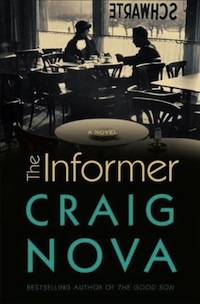
Craig Novais another of those fine writers who inhabit the literary terrain, blooming with regularity a splendid blossom of a novel. In this instance, his latest, The Informer (Shaye Areheart Books), is enthusiastically endorsed by Nova’s long-time champion John Irving:
The Informer
Accurate for the most part, except I think Nova has ruined the 1930s Berlin atmosphere (read Philip Kerr’s “Berlin Trilogy” for a paradigm of that skill) with a really heavy-handed description of one of the characters as “having hands the size of baseball mitts.”
Oh well, nobody (and no novel) is perfect.
* * *
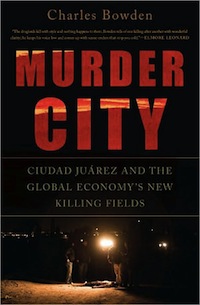
If you slogged through the second or third section of Roberto Bolaño’s 2666, where he painstakingly (and painfully) recounts a few of the hundreds of unsolved murders of women in Mexico’s border town of Ciudad Juárez, now comes Lannan Literary Award winning reporter/writer Charles Bowden’s Murder City: Ciudad Juárez and the Global Economy’s New Killing Fields (Nation Books), which may raise (some) consciousness of this deadly debacle on the U.S.-Mexico border but will hardly alter, as they say, the objective conditions on the ground.
And when Elmore Leonard blurbs a book, one must pay attention.
The druglords kill with style and nothing happens to them. Bowden tells of one killing after another with wonderful clarity; he keeps his voice low and comes up with scene-enders that stop you cold.
Bowden gives you a taste of this heinous absurdity:
If you can stand it, some more:
* * *
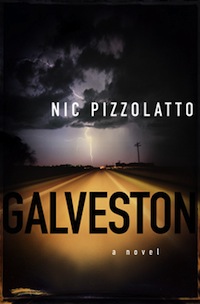
If you have gotten this far, I feel obliged to leave you on an uplifting note. My pick hit of the week is transplanted Louisianaian Nic Pizzolatto’s debut novel Galveston (Scribner). It is accurately summed up by my Boston homie Chuck Hogan (Devils in Exile), “Galveston is an assured debut full of hard truths, a throwback novel that ends up shouldering the noir genre forward.”
And for good measure, from one of my favorite novelists, Steve Yarbrough (Safe From the Neighbors), “Nic Pizzolatto is one of the most exciting young writers to come along in ages… Pizzolatto is going to be wowing us for a long, long time to come.”
